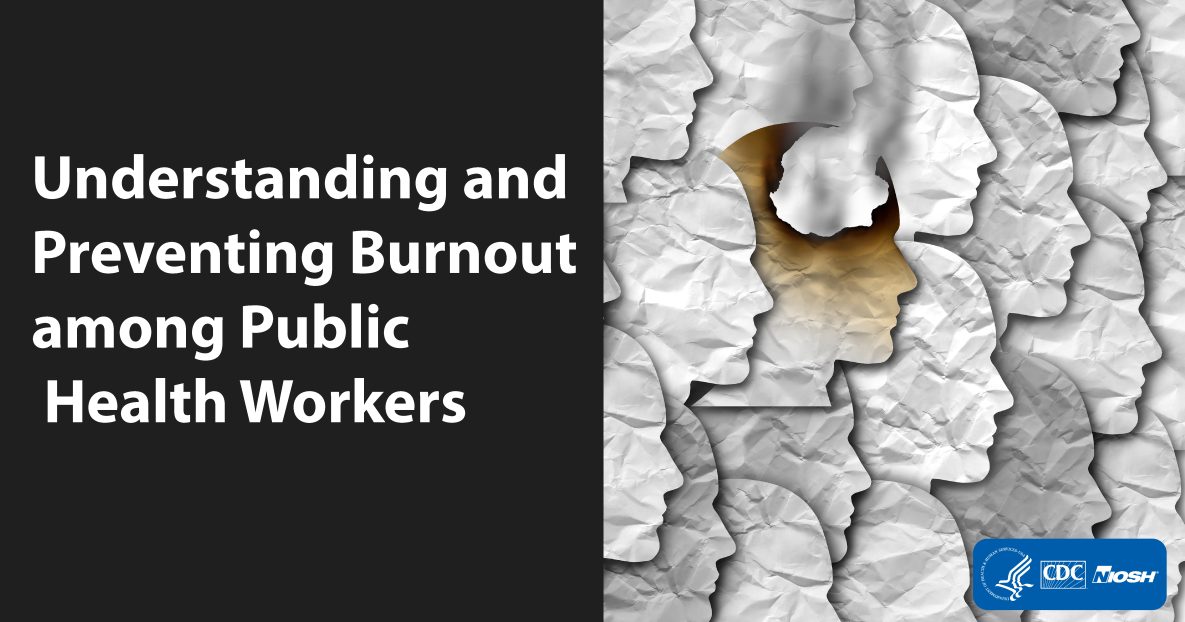Support for Public Health Workers and Health Professionals
Providing care and services to the public can be demanding and stressful. Work-related stress can affect your well-being, the care and services you give to others while doing your job, and the well-being of the people you care about outside of work.
It is critical for managers and supervisors to recognize what stress looks like, and to change organizational policies and practices to reduce job-related stress. It is also helpful for managers and workers alike to learn how to cope with stress and know where to go for help.
- Feeling irritated, angry, or in denial
- Feeling uncertain, nervous, or anxious
- Feeling helpless or powerless
- Lacking motivation
- Feeling tired, overwhelmed, or burned out
- Feeling sad or depressed
- Having trouble sleeping
- Having trouble concentrating
Know about burnout:
Workers experiencing burnout often feel exhausted and cynical. Working in a distressing environment can strain a person’s physical, emotional, and psychological well-being. Workers with burnout are more likely to experience mental health conditions like anxiety and depression. Burnout can also impact employee retention. Workers experiencing burnout may be less engaged at work and choose to leave their job or their profession altogether.
Managers and supervisors can play a big role in reducing and preventing job-related stress. Burnout can develop when workers have too many demands that require effort and not enough resources to meet those demands. While individual-level solutions like self-care and resilience training can help, changing workplace policies and practices the best way to address burnout.

CDC has an online training for public health supervisors and managers: Understanding and Preventing Burnout among Public Health Workers. Participants learn strategies to prioritize employee health and well-being and prevent burnout.
Managers and supervisors can use a Total Worker Health® approach to implement policies, practices, and programs. A program to reduce work-related stress might include:
- Implement organizational and management policies that eliminate the root causes of stress, such as excess demands or workplace bullying. Also implement policies that provide workers with increased flexibility and control over their work and schedules.
- Provide training for supervisors on strategies to reduce stressful working conditions.
- Provide training and interventions to build resiliency for stress management and reduction for all workers. Provide access to Employee Assistance Programs.
- Communicate with your coworkers, supervisors, and employees about job stress.
- Talk openly about how job stress is affecting your well-being.
- Identify factors that cause stress and work together to identify solutions.
- Ask about how to access mental health resources in your workplace.
- Identify and accept those things which you do not have control over.
- Take breaks during your shift to rest, stretch, or check in with supportive colleagues, coworkers, friends and family.
- When away from work, get exercise when you can. Spend time outdoors either being physically activity or relaxing. Do things you enjoy during non-work hours.
- Learn healthy ways to cope with stress.
If you’re concerned that you or someone in your household may harm themselves or someone else:
- 988 Suicide & Crisis Lifeline (formerly known as the National Suicide Prevention Lifeline)
- 988 for English or Spanish, or Lifeline Chat. TTY users can use their preferred relay service or dial 711 then 988.
If you need to find treatment or mental health providers in your area:
-
- Substance Abuse and Mental Health Services Administration (SAMHSA) Find Treatment
- SAMHSA Helpline: 1-800-662-HELP (4357) and (TTY) 1-800-487-4889
- SAMHSA Outreach Materials for crisis counseling, training programs, and disaster behavioral health programs
If you want more information on coping with stress and building resilience:
